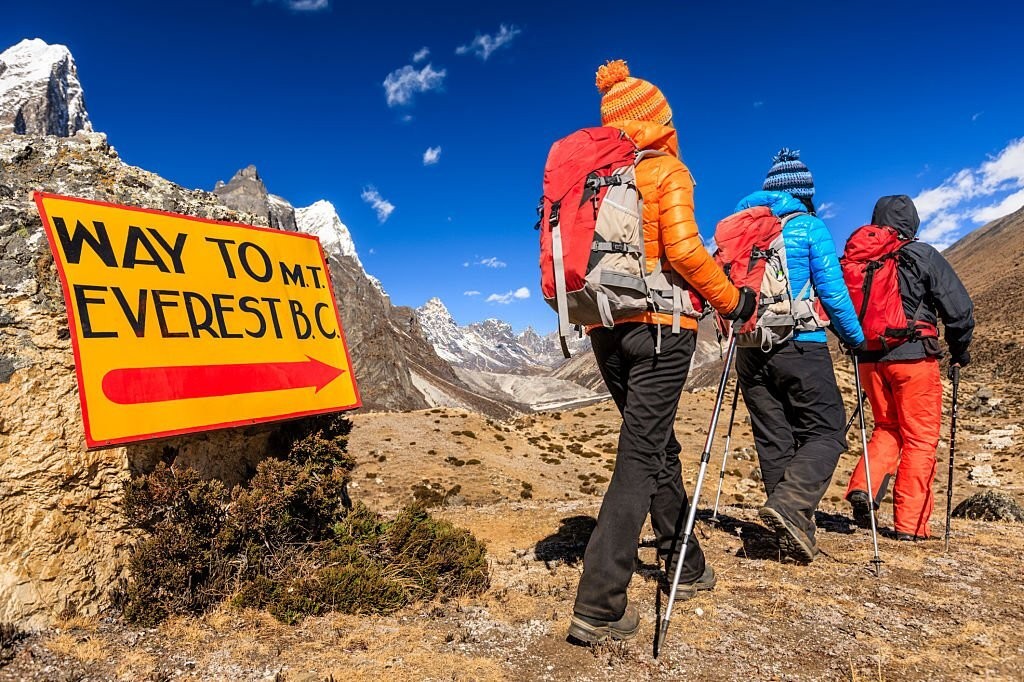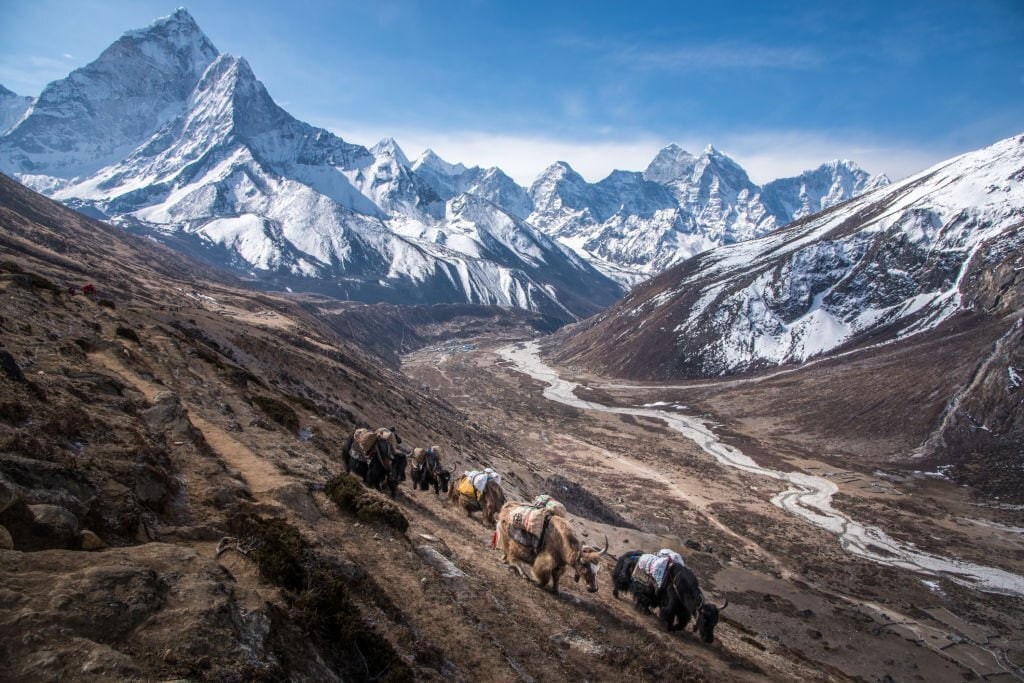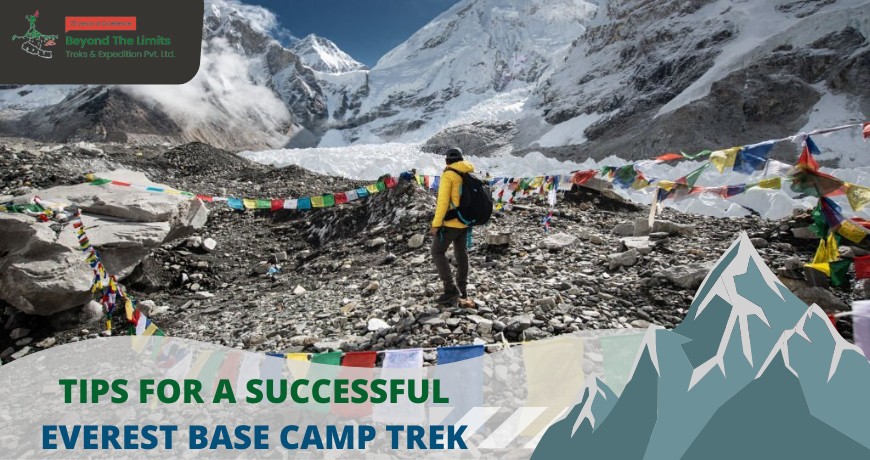
1) Prepare Physically and Mentally:
The most important thing for the Everest base camp trek is to train ahead of time. During your Everest Base Camp Trekking, you walk through the rugged and remote terrains, cross several suspension bridges, walk along narrow paths, climb ridges and face many challenges that require physical and mental endurance. Hence, preparing yourself beforehand by doing different cardio exercises such as hiking, running, stair climbing, and swimming will help to prepare your body. Similarly, since you will be on the trail for several days, fighting altitude sickness, and cold weather, you must be prepared mentally. While physical fitness can be maintained with regular exercises, the key to being mentally prepared is having a positive attitude and planning efficiently about the number of days you are willing to spend in the mountains.
2) Walk at your own pace:
Trekkers with several years of experience know that trekking is not a race, so they take their time and enjoy the walk soaking in the views on the way. However, new trekkers on the trail tend to rush things and suffer from health hazards like altitude sickness, injury and fatigue. The trekking company prepares different itinerary that suits a variety of trekkers. Therefore, choosing the best itinerary and slow walking is the best way to keep yourself safe from endless suffering on the trail. It also helps to conserve energy and makes you less tired, allowing you to enjoy your trip to the fullest.
3) Pack Light:
Unlike other trekking areas of Nepal, the Everest base camp trail has plenty of teahouses selling the essential items required during the trek. It is safe to be well prepared, but avoid packing randomly and pack things necessary on the trail. The most important is clothing, so remember to pack a thermal base layer, sleeping bag, down jacket, waterproof and windproof jacket, comfortable undergarments, hiking socks and boots. Also, pack toiletries and hygiene items, sunglasses, sunscreen, lip balm, a first aid kit, a water bottle, purification tablets, medications, light snacks and a handlamp or flashlight.
Packing light will not only help you to walk freely but will also help the potter accompanying you on the journey. Heavy backpacks cause unnecessary strain and physical pain. Hence, always pack according to the checklist provided by the trekking company to reduce weight.
4) Plan extra days:
If you are planning to return immediately after completing your EBC trek, always keep 2-3 days extra at the end. The Everest base camp trek starts with a Lukla Flight, and in many cases, the flight gets cancelled due to weather conditions. Hence, having 2-3 extra days will allow you to follow the itinerary, and you do not have to rush in the trail. One of the best ways to keep 1-2 days in the end is by planning your tour in Kathmandu at the end of the trek and not at the beginning. Having a few extra days will allow you to enjoy your Everest trek without being worried.
5) Stick to healthy meals and eat properly:
The teahouses of the Everest region offer a variety of food items, from traditional Nepali cuisines to continental dishes. However, the Nepali staple, Dal Bhat, is one of the nourishing meals you can try during your trek that provides all the vitamins and minerals required by the body. A balanced diet is crucial to boost immunity, gain energy, and help the body recover from muscle soreness and fatigue, so it is recommended to stick to the menu of the teahouses and eat food items that suit you. Food items like Momos, Thukpa, Roti, Curry and hot drinks are best to be warm and energetic during the trip. You should avoid drinking alcoholic beverages and drink water and hot soups to keep your body hydrated. Carrying your favourite snacks and energy bars can be helpful while you are on the trail.
6) Get enough rest and sleep:
Apart from slow walking and following the itinerary, you must also get enough rest and sleep to avoid hazards on the trail. Not getting proper sleep leads to problems like fatigue and exhaustion and degrades mental focus and concentration, which may lead to accidents. Together with this, lack of sleep also causes indigestion and headaches. Hence, getting enough rest and sleep will allow your body to acclimatize properly, promote muscle recovery and boost your immune system making your days on the mountains easy. Getting enough rest and sleep is necessary for both physical and mental well-being, so rest and sleep well on the trail.
7) Get Insured:
You may not hear this often, but getting insurance will help you to plan your trip better. Insurance can make you feel secure as it offers protection against any financial loss. Especially on the Everest base camp trek, you need to be extra careful about your health, as one may suffer from stomach problems or altitude sickness or have minor to major accidents. In such cases, you have to be transferred to the capital city by helicopter. The mountain rescue mission can be expensive, so having insurance that covers emergency medical expenses, flight cancellations, accidents, theft, or loss will provide you with peace of mind and financial protection against unforeseen events. Hence, make sure that you are insured and that your insurance policy gives the necessary coverage for your needs.
8) Sun protection is a must:
As you move to a higher elevation, the air gets thinner, and the UV radiation gets more intense. Hence, using a high-quality sunscreen with a high SPF can protect your skin from harmful rays that result in sunburn and skin cancer. Sunburn is known to be painful, dehydrating and uncomfortable, that may ruin your EBC trek. So make sure to reapply sunscreen and promote healthy skin. Apart from using sunscreen, you can also cover your face with a light shawl and wear hats and glasses to avoid sunburn. Also, lip balm with SPF is another important thing to pack for the trip as it can protect your lip from sunburn and keep it safe from chapped and dry. Lip balm helps to keep your lips moisturized and prevents them from cracking.
9) Drink Purified water only:
Drinking water is one of the concerns of trekkers trekking in the Everest region, as the water used in the teahouses comes directly from the small streams originating from the Himalayas. Hence, the water source might be polluted by human and animal waste knowingly or unknowingly, which leads to different waterborne illnesses. And the best way to avoid waterborne illnesses such as diarrhoea, cholera, and Typhoid fever is by boiling the water for at least 3 minutes or using water purification tablets or drops. Using these techniques will remove harmful bacteria, viruses and parasites, making water safe to drink. You can fill your water bottles at teahouses and then purify them using the mentioned techniques to reduce the use of plastic bottle waste on the trail.
10) Carry enough cash:
In Kathmandu or any other city in Nepal, you can easily find ATMs to withdraw cash. However, as you move towards the remote region, you have limited access to ATMs and Banks, as only Namche and Lukla have ATMs in the Everest region. Hence, we recommend you carry the cash required for food, accommodation and transportation. As the teahouses in the Everest region only accept cash as the mode of payment for goods and services, it is best to carry extra cash for snacks, tips for guides and potters, and to buy souvenirs of the Khumbu region.
Conclusion:
The Everest Base Camp trek is undoubtedly a once-in-a-lifetime experience requiring months of training, endurance and strenuous walks. However, once you set foot at the base camp, you will realize it was worth all the challenges, as seeing Mount Everest in front of your eyes is one of the greatest feelings in the world. So if you are planning your EBC trek anytime soon, remember Beyond the Limit treks and expeditions, and we will provide you with the details to make your trip memorable.
Related Blogs:
✔ Best Treks in Everest Region for 2023
✔ Common Mistakes to Avoid During Everest Base Camp Trek
✔ Tips for Solo Female Trekking to Everest Base Camp

Top 5 FAQs on Everest Base Camp Trek:
1) Is altitude sickness a common problem during the Everest Base Camp Trek?
▪ Yes, Altitude sickness is a common problem during the EBC trek, as you will trek to a high altitude. The symptoms of the sickness may range from headache, nausea and dizziness to lung and brain swelling in severe cases. Hence, allowing your body to acclimatize to the change in altitude is a must. Together with this, trekkers need to drink plenty of fluids, especially water and use medicine like acetazolamide to reduce the symptoms of sickness.
In addition, eating a balanced diet, avoiding alcohol, and smoking can also reduce the chances of altitude sickness.
2) Is Travel Insurance necessary for the Everest Base Camp trek?
▪ Travel insurance for the Everest Base camp trek is not mandatory, but we recommend our trekkers have insurance that will cover emergency rescue, medical expenses, flight cancellations, accidents, theft or loss and any other unforeseen circumstances that may occur during the trek.
3) What kind of physical fitness level is required for the Everest Base Camp trek?
▪ The Everest base camp trek is a moderate trekking experience in the Everest region that requires moderate physical fitness. Any novice or experienced trekker can complete the EBC trek, with proper training and acclimatization.
4) How long is the Everest Base Camp trek?
▪ The Everest base camp trek is a 12-14 days program, determined by route and the number of acclimatization days on the trail.
5) Can I find WIFI and internet access during the Everest base camp trek?
▪ Yes, There are teahouses in the Everest region offering WIFi and internet facilities, usually after paying a little extra charge. However, the quality of the connection may vary according to the location and weather conditions.
Popular Trekking around Everest Region:
✔ Gokyo Ri Trekking
✔ Everest Three Passes Trek
✔ Everest Base Camp Trek Cost










